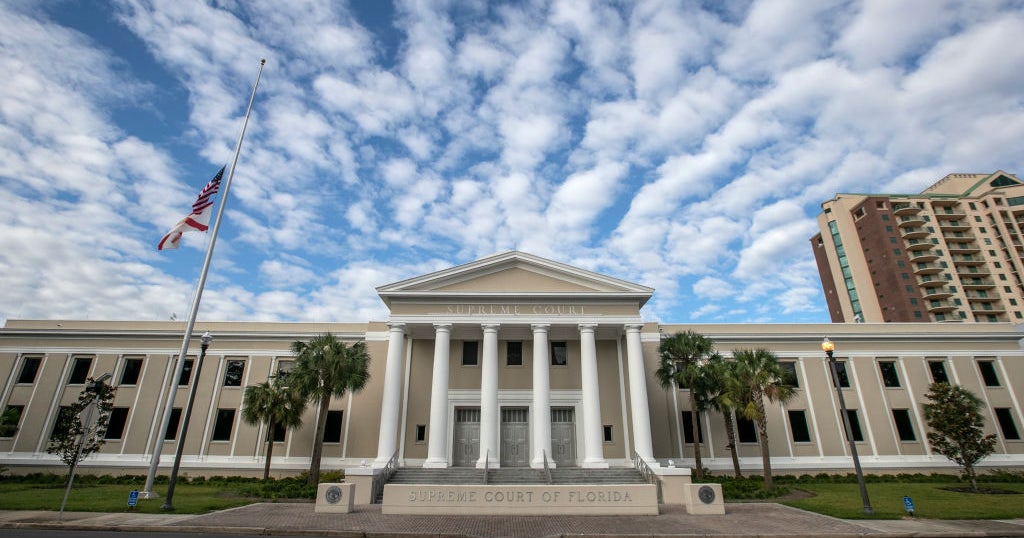TALLAHASSEE – The Florida Supreme Courtroom on Wednesday agreed to choose up a challenge to the constitutionality of a congressional redistricting approach, but it seems the situation will not be solved before a prospect-qualifying deadline for the November elections.
The Supreme Court issued an purchase indicating it will listen to an attraction by voting legal rights groups and other plaintiffs, rejecting arguments by the condition that it really should switch down the scenario. The voting legal rights teams went to the Supreme Court just after the 1st District Courtroom of Attraction on Dec. 1 upheld the constitutionality of the redistricting program.
But a timeline in the Supreme Court’s buy indicated that the case probably not be fixed prior to a applicant-qualifying period for 2024 congressional races. That qualifying time period is scheduled from April 22 to 26.
The purchase gave lawyers for voting-legal rights groups until finally Feb. 28 to file an first transient, adopted by 30 times for legal professionals for Secretary of Condition Cord Byrd and the Legislature to file what is known as an remedy short. The voting rights groups would then have 30 times to file a further quick, and the buy elevated the chance of the state possessing 30 days to file an added temporary.
The buy did not established a day for oral arguments, which will adhere to the filing of briefs. It explained lawyers “will be notified of the oral argument day somewhere around 60 times prior to oral argument.”
Base line, these kinds of a timetable could have the effect of trying to keep in put the disputed congressional prepare for this year’s elections. That map, pushed by the Legislature by Gov. Ron DeSantis, aided guide to Republicans selecting up seats in the 2022 elections.
The scenario facilities on a North Florida district that in the past elected Black Democrat Al Lawson but was overhauled in the course of an April 2022 exclusive legislative session. The overhaul set the district, Congressional District 5, in the Jacksonville space, and white Republicans gained all North Florida congressional seats in the November 2022 elections.
The plaintiffs argued the overhaul violated section of a 2010 constitutional modification, known as the Truthful Districts Amendment, that barred drawing districts that would “diminish” the skill of minorities to “elect associates of their alternative.” Though a Leon County circuit choose agreed with the plaintiffs, the 1st District Court docket of Charm overturned that conclusion and ruled in favor of the condition.
In a Dec. 13 transient inquiring the Supreme Courtroom to hear the circumstance, lawyers for the plaintiffs contended the appeals court’s final decision violated Supreme Courtroom precedents in redistricting conditions, including a situation that led to the previous style and design of Congressional District 5.
“In sum, the 1st DCA (District Court of Charm) expressly contravened and solid apart this (Supreme) Court’s conclusions decoding the Honest Districts Amendments and established a new take a look at that simply cannot be reconciled with a number of conclusions of this courtroom,” the temporary explained. “The court really should assert jurisdiction to suitable the Initially DCA’s brazen try to ignore this court’s precedent.”
A critical difficulty in the 1st District Court of Appeal’s ruling was the sprawling shape of the former Congressional District 5. The district stretched from Jacksonville to Gadsden County, west of Tallahassee, incorporating areas with considerable quantities of Black voters.
The appeals court’s principal opinion explained the security offered by what is recognized as the “non-diminishment” clause of the Good Districts Modification and the federal Voting Legal rights Act “is of the voting power of ‘a politically cohesive, geographically insular minority team.'” It said linking voters across a substantial extend of North Florida did not fulfill these types of a definition of cohesiveness.
In filings Dec. 29 at the Supreme Court, lawyers for Byrd and the Legislature disputed that the appeals-courtroom ruling violated Supreme Courtroom precedents and cited the sprawling nature of the former district, recognised in the case as “Benchmark CD-5.”
“The To start with District rightly rejected petitioners’ (the plaintiffs’) non-diminishment assert,” attorneys for Byrd wrote. “Petitioners unsuccessful to verify that Benchmark CD-5 contained a compact and naturally developing black group with shared passions, or that the district was reasonably configured.”
Attorneys for the condition also reported the Supreme Court should let stand the appeals court ruling rather than using up the scenario.
“The 1st District’s final decision is correct, these information (in the scenario) are unlikely to recur, and evaluate at this late phase would go away state election officials unsure as they get ready for the 2024 primaries,” attorneys for Byrd, the state’s main elections formal, wrote.
The Supreme Court voted 6- to acquire up the case, with Justice Charles Canady recused. As is typical, the ruling did not make clear Canady’s explanation for recusal, even though his spouse, Jennifer, is a point out Residence member.
A individual problem to the redistricting strategy is pending in federal court docket. That circumstance will involve federal constitutional concerns.




